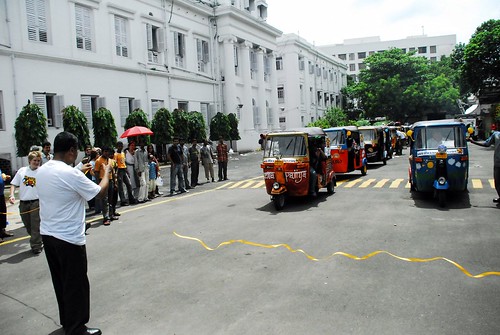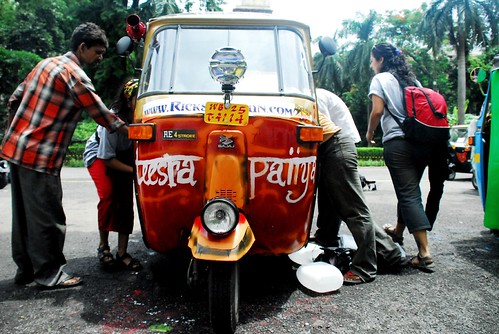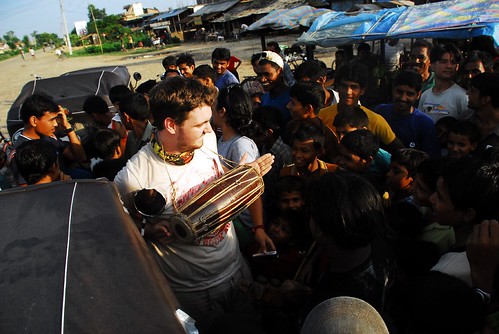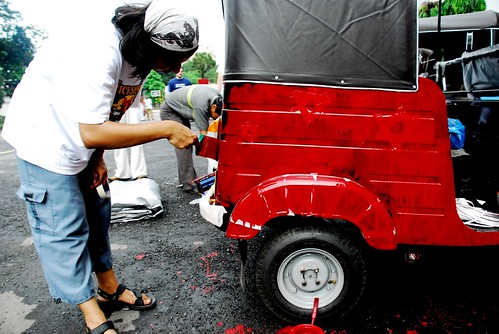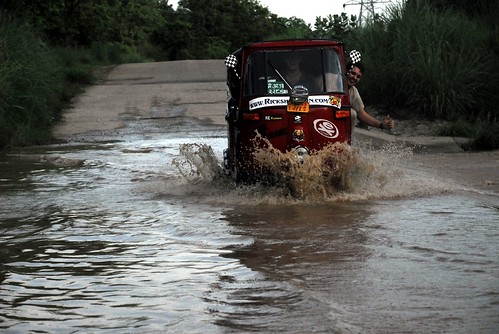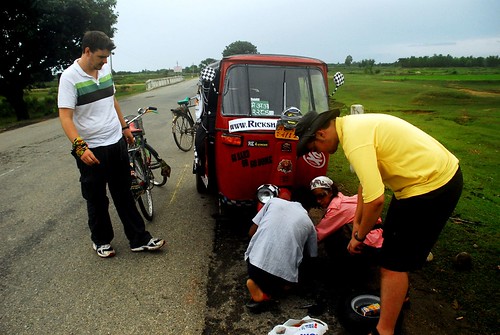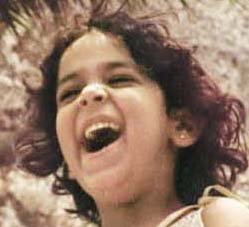Behrampore-Islampur
231km -590km
The Brits probably think we’re daft, but we left today at 5am and decided to go off the map. Do some sightseeing and explore a little instead of driving point-to-point in a mad rush to reach the Nepal border.
So we had our morning tea in Lalbagh, a little town 20km off Highway 34 to Siliguri. I don’t think I have seen a morning so green and fresh in a long time. Hardly anyone was out on the roads, and everywhere we stopped for directions, people were surprised to hear us talk Hindi, cause only ‘foreigners could be dumb enough to do something like this.’
But we were too engrossed by the sights to bother to explain why we were doing what we were doing. (What would we say? That it was a combination of wanting to do something interesting, have an experience worth writing about, raising money for charity, being the only Indians in the Run and a healthy dose of madness?) A small cloud trailed us, moistening the air with light rain. Dappled sunlight made the fields shine in different shades of green. A stream flowed by the road, populated with little floating gardens. Men sat at the shore, casting fishing lines into its gently flowing water.
We stopped for tea at the Katra Mosque in Lalbagh where Murshidkuli Khan was buried (alive, a local said, “Who bada kameena aadmi tha”) about 250 years ago, though my facts might be a bit hazy (and I can’t cross check right now, writing as I am from the back of an autorickshaw).
By 10am, we were off the country roads and we soon crossed three teams that were stopped by the side of the road. One of them had a flat tyre and they were having trouble getting their spare wheel out. One of the boys had a nasty scratch and we offered the service of our antiseptic and bandages. But they seemed all right, so we were on our way again. A little while later, our clutch went on limp, and Akshay who was driving then, discovered that he couldn’t change gears anymore. He managed to pull up by the side of the road, and we found out that there was a motorcycle mechanic in the village who may be help us. So off we went, me behind the wheel, urging Saira along in first gear through narrow, muddy and rather rocky village lanes. We found the mechanic and put him on the job, but it didn’t take us more than two minutes to realise that he knew even less than us about autorickshaw mechanics. So we asked him to put everything back the way it was and go on and hunt for a different mechanic. I found a little nut on the floor of Saira and asked him to put it back where it belonged. He said he’d not taken it off and it was just some random bit that I should throw away. For some reason, I tucked it in my pocket (luckily).
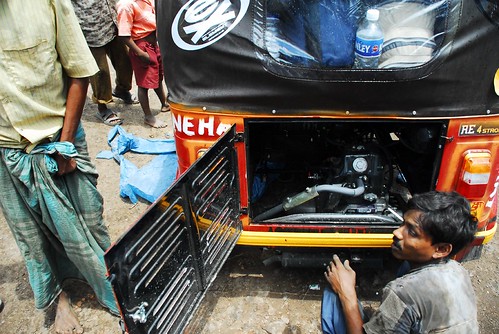
So we were back on the road, driving at the speed of 10km per hour on a busy highway and trying not to get run over before we found a mechanic. This time we were luckier. Mohammed Ansari had never worked on a rickshaw before but he was confident he could fix it. So while he started work under Shez’s supervision, I foraged for breakfast. I returned to a rather breathless Shez, who anxiously asked me if I had kept the little nut I had found on the floor. I got a beaming smile when I said I had. It turned out that our clutch problem was simply caused by a loose nut (heh!) and had been compounded by the inefficient mechanic before who’s simply removed it and forgotten to put it back.
Around this time, the three teams that we’d stopped for earlier drove past us. They didn’t stop to help, even though it was obvious that we were in trouble and the three of us loudly cursed the entire British nation for their callous behaviour. But soon Chris and Owen, the Vindalosers, came along to redeem the British people, not only stopping to ask if we were okay, but staying till our problem was fully solved.
The other teams were gunning it for Siliguri, but we decided we were in no hurry and didn’t was to miss the tea estates along the route in the darkness of the night, so we stayed at Islampur for the night. We’d been told to avoid staying there since it is close to the Bihar border, but we found a brightly-lit government guest house next to the bus depot and a shopping complex and spent a comfortable night there. We slipped the night watchman Rs50 to keep an eye on Saira and Jess (Chris and Owen’s ride).
cross posted on teesra
